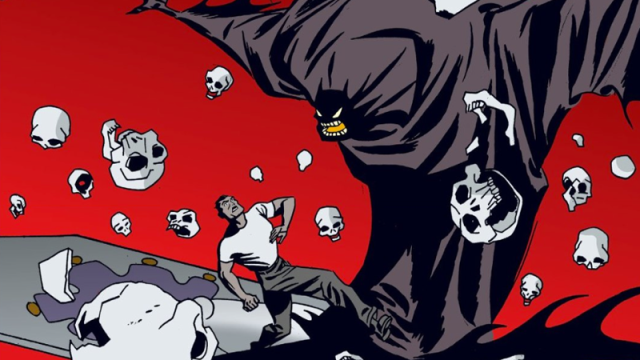When Matt Reeves lifted the lid on The Batman this past weekend at DC Fandome, much was made of the period of just when we’ll meet this new Dark Knight. Batman will bring vengeance during the second year of his career, evocative of Mike W. Barr, Alan Davis, Paul Neary, Alfredo Alcala, Mark Farmer, and Todd McFarlane’s seminal Detective Comics storyline. But when discussing comic book inspirations, Reeves namechecked a fascinating icon.
The DC Comic Reeves mentioned was Darwyn Cooke and Jon Babcock’s Batman: Ego, the 2000 story that can now be found in the excellent anthology Batman: Ego and Other Tails, featuring some of Cooke’s definitive storytelling with the Dark Knight.
[referenced id=”1285280″ url=”https://gizmodo.com.au/2020/08/matt-reeves-says-the-batman-will-find-the-caped-crusader-at-a-pivotal-moment-in-his-heroic-evolution/” thumb=”https://gizmodo.com.au/wp-content/uploads/2020/08/24/xys04yeikobj6rybj18m-300×169.png” title=”Matt Reeves Says The Batman Will Find the Caped Crusader at a Pivotal Moment in His Heroic Evolution” excerpt=”This isn’t an origin story. If anything, it’s Batman: Year Two. (No, not the one where he almost shoots Joe Chill.)”]
“You’re able to understand his motivations, but Batman [is broken], and why he’s doing all of these things for the reasons that he thinks is right and that have a heroic sort of grounding in them,” Reeves said at the film’s panel last Saturday. “There’s also many things that are driven by the parts of himself he doesn’t yet know, and so I would say that that kind of sort of psychological union, that sort of version is very much connected to the vision from Darwyn Cooke’s Ego.”
In the wake of Reeves’ comments, copies of the collection have been selling out online, but unfamiliar readers may not find the Batman story they think they will. What they will discover instead is a potent examination of the man that inhabits the mask and a powerful reminder that, as much as we romanticize Batman as this hero — always steps ahead of everyone around him, the perfect badass — both the hero and the human behind him are deeply, traumatically flawed.
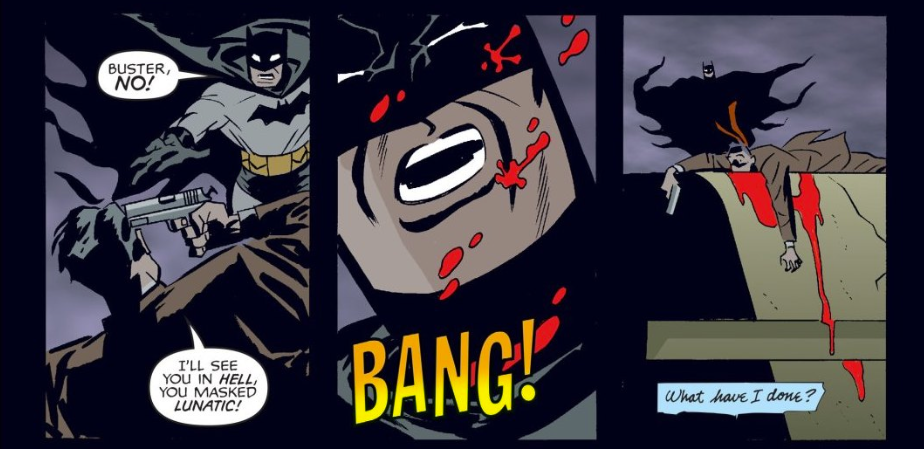
Set after a night patrol ends with Batman watching one of Joker’s henchmen (a driver named Buster Snibbs) shoot himself rather than confront the wrath of his horrifying boss, Batman: Ego is a story about Batman losing his way in a city whose expectations of him threaten to crush him wholesale. Bruce ponders this in the opening narration, shaken by Snibbs’ suicide and the revelation that he also murdered his wife and child, so scared of what the Joker might do to them after his own death. Bruce returns to the Batcave tired, wounded, and beaten down by being the Batman until, suddenly, he finds himself not alone in his sanctum…sort of.
Part delirium from blood loss, part long-lingering insecurities bubbling into the fore, Bruce finds himself confronted with an extrapolation of his titular ego: and, because this is Bruce Wayne, that Freudian conscience that balances his mind is Fear. Coalesced in front of Bruce in this moment of exhaustion is every mistake he’s ever made, become sentient.
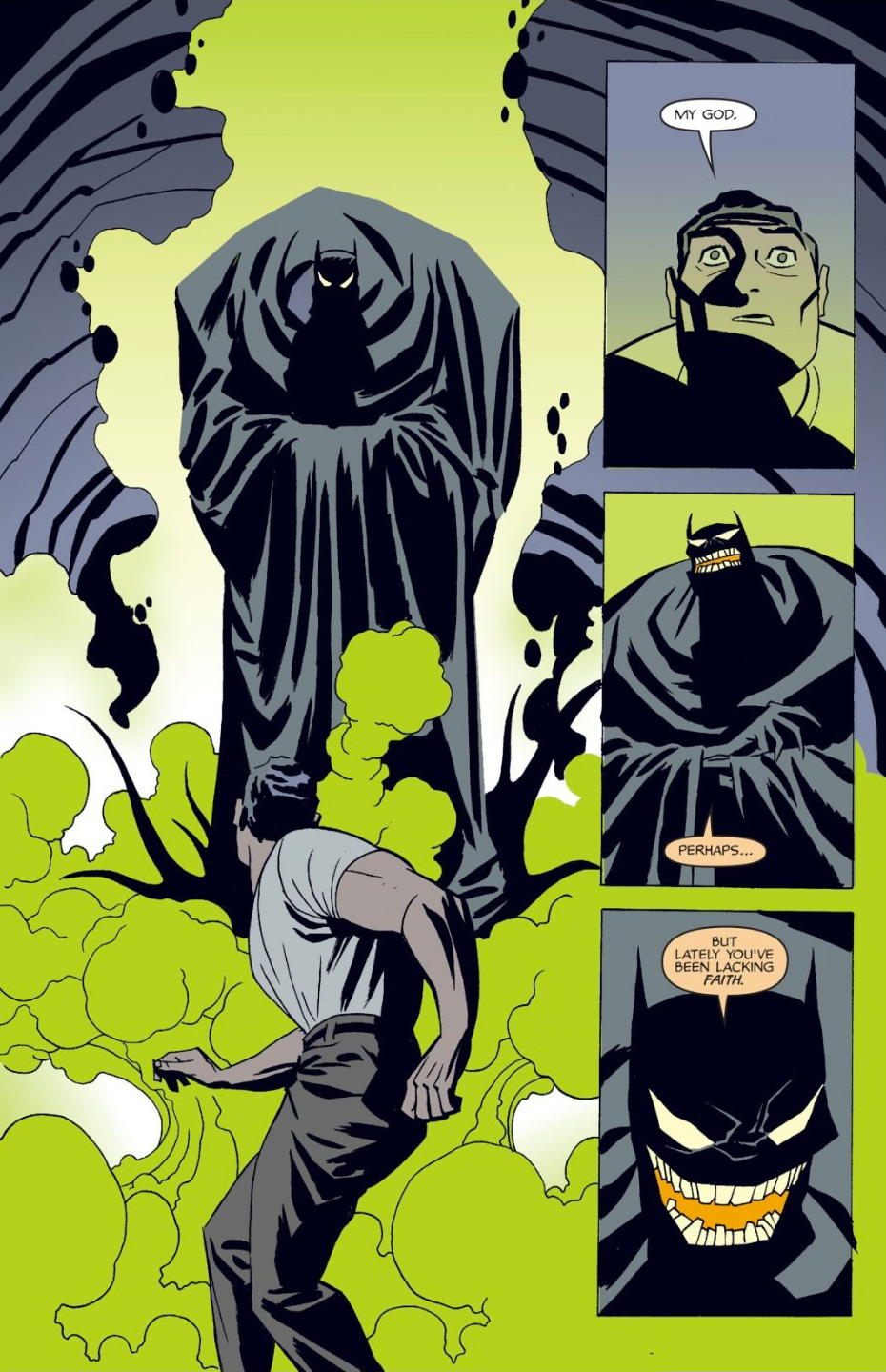
Ego isn’t an origin story, although it is a story that spans from Bruce’s happy childhood all the way up until the present of Cooke’s seasoned, contemporary Batman. Instead, through the lens of Bruce’s external-internal debate with his own ego, it’s an examination of every decision Bruce has ever made as Batman. The embodiment of Fear itself needles Bruce with criticism after criticism as we race through the fundamental building blocks of his crimefighting history.
Why did he do it in the first place? Why did he find it so easy to embrace what fear did to his opponents in his early days, before, as Fear puts it, Batman became a “celebrity”? Why did he make himself so alone, only to bring others — literal children — into his violent world? Why did he create the perfect environment for a Rogue’s Gallery of villains as haunted and broken as he is to flourish? Why did he not just create the Joker, but won’t even eliminate him permanently to stop his monstrous, murderous spree? Why does Bruce Wayne keep failing, Fear asks of its host time and time again, to do what the Batman should?
That the arch embodiment of Bruce’s primal fear is so preponderantly focused on what it (and therefore Bruce in turn) perceives as a lifetime of failures already says a lot about what he thinks of himself as both man and Batman. That if he just gave in to all that doubt and insecurity and inhabited the power that fear can have — just like that moment in The Batman trailer when, almost as if losing himself for a moment, Robert Pattinson’s Dark Knight horrifically beats a thug well past subjugation — he’d be free of these flaws and the doubt that comes with them. The Batman could truly be the tool Gotham City needs, a remorseless, mighty force that strikes all of its ills down. And, because he is indeed a flawed man after all, for a moment Bruce contemplates giving in to that desire.
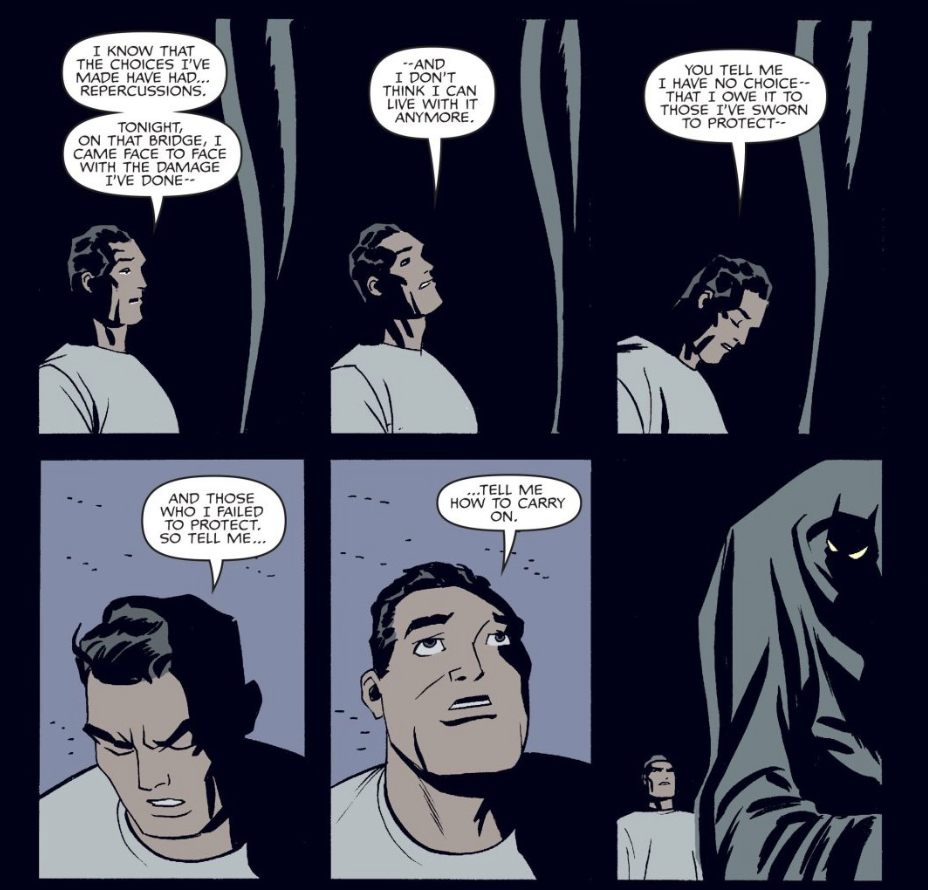
But ultimately, despite acknowledging these failures as flaws, Bruce hails them as strengths. He is but a man, albeit one who has confronted, and continues to confront, horrible traumas in his life. The Batman as an idea may be some lofty, perfect shield, but there is still a man that is part of it — and sacrificing that man, giving into that fear, would make him a monster rather than the symbol of hope he wants to be in his dark world. In the end, Fear and Bruce come to a tumultuous compromise that represents the struggle he faces as Batman every day of his life: if the Fear within can accept that Bruce wants to make the world a better place without giving in to that primal urge, Bruce can accept that Fear — and all the doubts and flaws he feels as part of that, all the mistakes he’s made in his life — will always be a part of him.
Fundamentally, Ego is a story about Bruce’s vulnerabilities. The fear that attacks him throughout the tale is of himself, a being that relitigates every single choice he’s made since he put on the cowl. The fact that Cooke does so with a “definitive” Batman — a hero at the height of his prowess, a legend forged in his own right — speaks to the potency of that fear, of its doggedness. The fact that Bruce has to confront and acknowledge it every day of his life as a crimefighter, even after so long, speaks to the struggle that he feels as the Batman every step of his career.
The fact that it takes just moment of someone else giving into that fear to send him on this spiral doesn’t just speak to the power it holds over Bruce but reminds us how deeply vulnerable, how deeply human he is. Reeves taking that sort of internalized trauma and haunted introspection and framing it around a much, much younger Batman, navigating the earliest phases of his career and what he stands for as a hero, is an incredibly compelling thought.
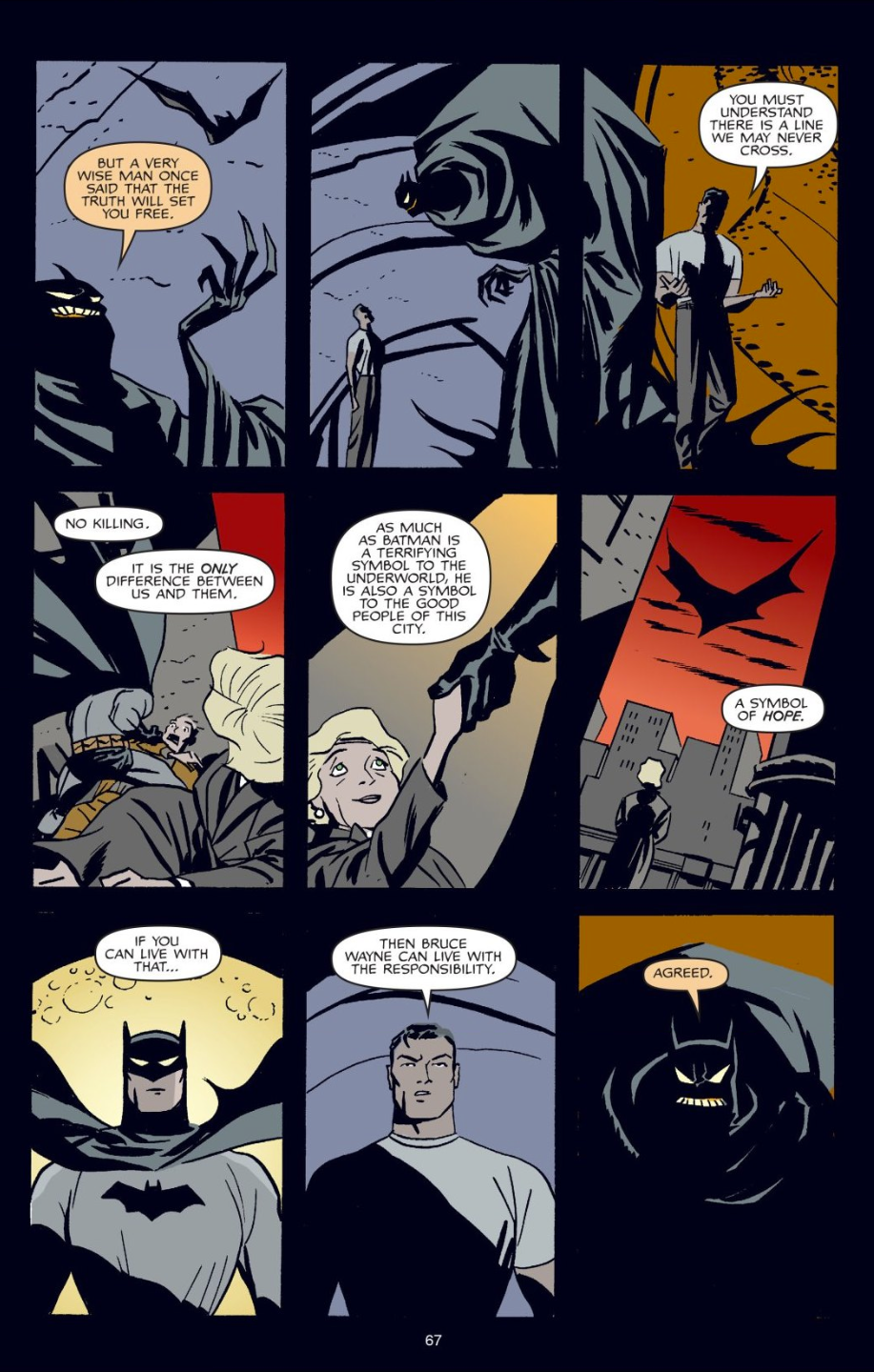
Sure, we’ve had emotive dark knights at the box office before, tragic heroes filled with grief and rage, rising above their darkest impulses to triumph. But Ego is a story about flaws, vulnerabilities that Bruce examines and embraces as fundamental aspects of who he is in and out of the mask. That sort of introspection is rarely put to the forefront of the Batmen we’ve met on the big screen, even in origin stories, to centre the hero that he becomes in spite of those fears and flaws.
If The Batman takes Ego’s ultimate lesson to heart — that this fear is something Bruce accepts in himself as an ever-present force, that he is always going to be flawed and vulnerable, but that it is a sacrifice worth paying to be the hope that Gotham needs — we’re in for a Caped Crusader perhaps unlike anything we’ve ever seen in Batman’s cinematic history.
